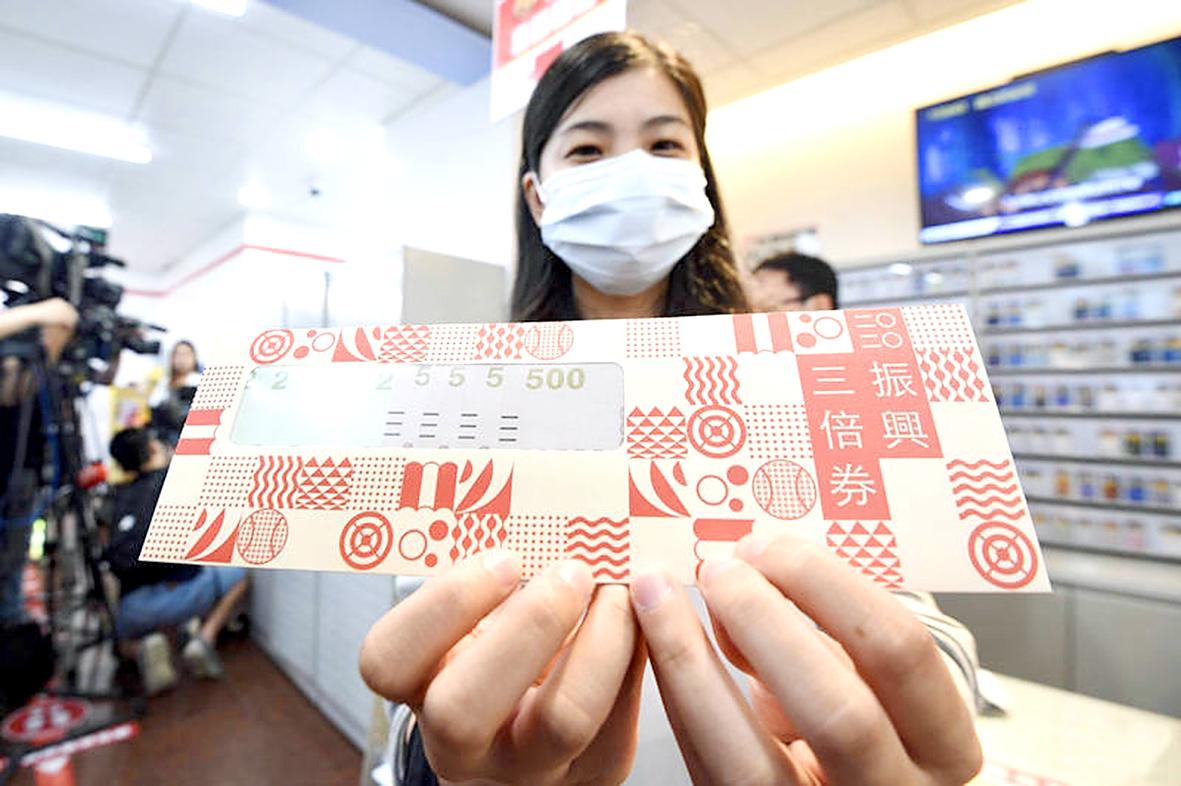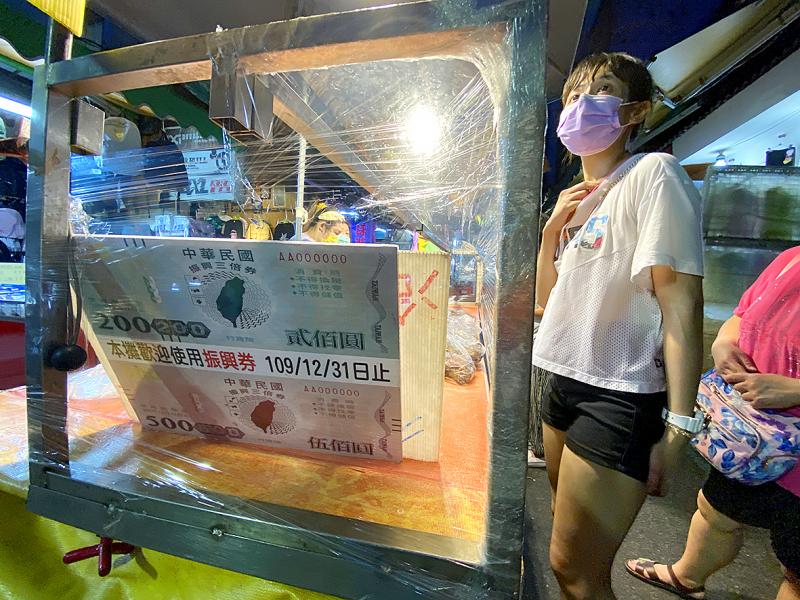This week the government announced another COVID-19 relief voucher plan. The funding will come from the fund originally established for the crisis, which still has NT$160 billion left in it, and is meant to target the food service industry, which has been hard hit.
The plan calls for recipients to purchase NT$5,000 in vouchers for NT$1,000 in cash (a total of NT$100 billion in handouts). The vouchers, which will likely arrive late next month or in October, must be picked up in person, which has lead Chinese Nationalist Party (KMT) legislators to criticize the program for the obvious risk of COVID-19 spread.
The vouchers cannot be used to pay bills or fines. This has led to calls, especially from the KMT, for cash handouts, which would really help the working poor spend money where they need it to be spent. This is laudable, but recall that working people are also helped if people spend more money on food and other services.

Photo courtesy Ministry of Finance
An oft-criticized aspect of the program is that NT$1,000 has to be forked over to receive NT$5,000 in paper vouchers. When the government does this, it pulls cash from the economy. This helps reduce the inflationary effect of the program. Balancing the creation of money with removal of cash reduces the amount of tinkering the government has to do with the banking system and interest rates to adjust to the money creation. Finally, it forces people to spend the money received, increasing its immediate effect on the economy, since it is difficult to save the vouchers.
The major problem with the government’s COVID-19 response isn’t unnecessary complexity. It is the government’s overall stingy, strangled response to the ongoing financial problems generated by the crisis, itself another manifestation of the government’s miserly social welfare programs.
IGNORING PART-TIME WORKERS

Photo: Tu Chien-jung, Taipei Times
The voucher program, splashing across the media, makes a neat distraction from the problems with the government’s pandemic response programs. A recent piece at Taiwan Reporter summarized these crisis programs as having high thresholds, offering low levels of subsidies and ignoring part-time workers. Worse, they often give incentives to employers to close their businesses rather than pay workers.
The food service industry is filled with part-time workers. The government could have supported them with a generous comprehensive program to either keep businesses open or give payments to workers, but instead we get a single small voucher that will provide indirect temporary relief, rather like giving a person in despair a shot of whiskey and a bowl of pretzels.
Hence, arguments over whether the payments should be vouchers, cash or an app (or a check, as one political party has absurdly argued) are like debating what color to paint a house on fire.
FOREIGN STUDENTS
Indeed, the use of gaudy public subsidies to hide systemic issues raised by COVID is also evident in the government’s recent and well-publicized decision to allow 13,000 foreign students in, to help keep slowly dying universities afloat, while requiring foreigners to leave Taiwan to change their visa category, at a time when the Ministry of Foreign Affairs (MOFA) is not granting residency visas (hence visa changers can’t return) or permitting many visa holders with secure jobs to enter the country.
Foreigners often complain, rightly, that they are left out of programs that they pay taxes for, but they are hardly alone. This trifecta of tight-fistedness (stringent requirements, low subsidies, unintended and opposite effects) is widespread across Taiwan’s social welfare programs.
Consider programs to help the working poor. According to a recent paper by Li Shu-jung (李淑容) of Soochow University, the number of working poor in Taiwan, by the government’s definition, is only a bit over 197,000, or 1.7 percent of Taiwan’s 11 million workers.
That figure is laughably low (the EU figure was 9.6 percent in 2019), and rises several times if more robust international definitions are used. Thus, the modest poverty rates in Taiwan are partly an illusion created by lowball government figures.
The government’s poverty programs are shaped by the social values of self-reliance and strong work ethics, Li writes, adding that the system has three key features not found in other countries. First, when income is calculated, the recipient’s “family” is not the nuclear family or household used in other nations, but the extended family defined in law. Second, if a family has property valued above a threshold, it is not considered “poor.” Third, if people have the ability to work but are not employed and have no income, they have a simulated income attributed them based on the minimum wage when their “family income” is calculated.
TAX AVOIDANCE AND EVASION
Yet, this stinginess reflects an important national preference: the government is underfunded. Off the books income is common, and tax evasion is a way of life — the Cabinet recently approved a draft bill to raise the punishments for it, as if that will have any effect.
Each year the identities of major individual and corporate tax evaders are published on a government Web site. The total sum owed by the top non-payers on the list exceeds NT$100 billion, or roughly the value of the current proposed voucher program.
As this paper noted in an editorial earlier this month: “people are wondering if the list still packs any punch, as this year’s top 20 are similar to those of previous years, with the oldest case going back to 1985.”
Tax evasion, though, pales beside the legal routes for avoiding taxes in Taiwan. The wealthy can park their earnings in real estate, protected by a land tax assessment that has essentially remained unchanged since 1987. The lack of taxes on other forms of income mean that many wealthy pay few taxes. This was actually an issue in the most recent presidential election, with Hon Hai Precision Industry Co (鴻海精密) founder and presidential hopeful Terry Gou (郭台銘) calling for a special tax on the wealthy.
I have often speculated, though I have no direct evidence, that the low taxes on the wealthy were Lee Teng-hui’s (李登輝) tacit approach to reducing opposition from the wealthy to Taiwan’s democratization. So long as their wealth was not imperiled via higher taxation, they could remain indifferent to what form of government Taiwan chose. This would make Taiwan’s tax situation an ironic outcome of its democratization.
NATIONAL DEFENSE THREATENED
With taxes low and evasion widespread, Taiwan’s tax take as a proportion of GDP is extremely low for such a developed country. Total tax revenues last year were US$84 billion, compared to a nominal GDP of US$650-700 billion. According to OECD statistics, in 2019 the median take for all 37 OECD countries was 33.8 percent.
Government impoverishment in Taiwan is not just a problem for a modern society that needs a broad array of social welfare programs, it also hurts the nation’s defense and security.
Taiwan thus presents the weirdly conflicting portrait of a nation whose people are willing to die in its defense, but not to tax themselves to pay for the weapons they will need or the programs that are necessary to support their fellow Taiwanese — of a people who won’t pay taxes, but then wonder where the money is when they get in trouble.
Never mind: even if you get in trouble, you can’t pass the threshold for help.
Notes from Central Taiwan is a column written by long-term resident Michael Turton, who provides incisive commentary informed by three decades of living in and writing about his adoptive country. The views expressed here are his own.

Jacques Poissant’s suffering stopped the day he asked his daughter if it would be “cowardly to ask to be helped to die.” The retired Canadian insurance adviser was 93, and “was wasting away” after a long battle with prostate cancer. “He no longer had any zest for life,” Josee Poissant said. Last year her mother made the same choice at 96 when she realized she would not be getting out of hospital. She died surrounded by her children and their partners listening to the music she loved. “She was at peace. She sang until she went to sleep.” Josee Poissant remembers it as a beautiful

For many centuries from the medieval to the early modern era, the island port of Hirado on the northwestern tip of Kyushu in Japan was the epicenter of piracy in East Asia. From bases in Hirado the notorious wokou (倭寇) terrorized Korea and China. They raided coastal towns, carrying off people into slavery and looting everything from grain to porcelain to bells in Buddhist temples. Kyushu itself operated a thriving trade with China in sulfur, a necessary ingredient of the gunpowder that powered militaries from Europe to Japan. Over time Hirado developed into a full service stop for pirates. Booty could

Lori Sepich smoked for years and sometimes skipped taking her blood pressure medicine. But she never thought she’d have a heart attack. The possibility “just wasn’t registering with me,” said the 64-year-old from Memphis, Tennessee, who suffered two of them 13 years apart. She’s far from alone. More than 60 million women in the US live with cardiovascular disease, which includes heart disease as well as stroke, heart failure and atrial fibrillation. And despite the myth that heart attacks mostly strike men, women are vulnerable too. Overall in the US, 1 in 5 women dies of cardiovascular disease each year, 37,000 of them

Before the last section of the round-the-island railway was electrified, one old blue train still chugged back and forth between Pingtung County’s Fangliao (枋寮) and Taitung (台東) stations once a day. It was so slow, was so hot (it had no air conditioning) and covered such a short distance, that the low fare still failed to attract many riders. This relic of the past was finally retired when the South Link Line was fully electrified on Dec. 23, 2020. A wave of nostalgia surrounded the termination of the Ordinary Train service, as these train carriages had been in use for decades